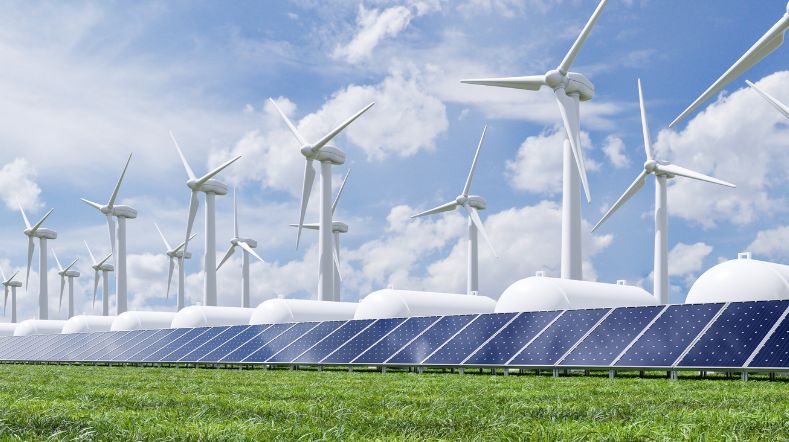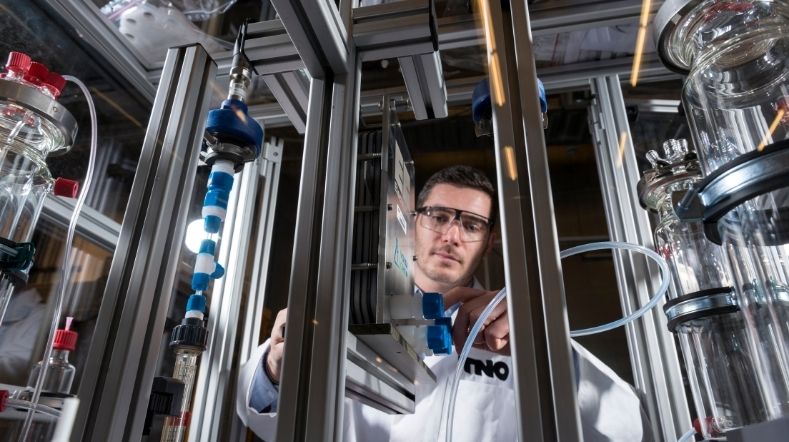
Energy storage platform: working on storage after 2030
In the current largely fossil energy supply, the Netherlands has large reserves of oil and gas as a buffer against unexpected events. But after 2030 a large part of our energy will come from offshore wind, to the extent that we will generate more electricity than we use. By that time, we must have improved and new methods of large-scale energy storage ready.
TNO is working on technological solutions to store energy in all kinds of forms so that demand can always be met.
Various TNO laboratories play a role in this, such as the Rijswijk Centre for Sustainable Geo-energy (RCSG) for geothermal heat storage, the Faraday lab in Petten for improving technologies such as electrolysis for storing hydrogen, and the Carnot lab that focuses on heat storage. Geomechanical and biomechanical research takes place in the TNO labs in Utrecht and Eindhoven.
Flexibility and security of supply
The solutions required range from low-power storage that can be supplied quickly to high-power storage in large volumes for the longer term. Energy storage is crucial to make our future energy system flexible. It ensures security of supply during periods when there is too little renewable energy available. TNO has a broad portfolio of storage technologies that we want to accelerate to maturity.
Large-scale storage above and below ground
All research is aimed at having technologies that can be used to store energy and energy carriers on a large scale within ten years. This involves underground storage of mainly hydrogen and high-temperature heat in salt caverns, empty gas fields and aquifers.
Above ground it concerns batteries and the conversion of electricity into energy carriers that can easily be stored in storage tanks, for example. Many of these storage technologies do exist, but are far from sufficient in the future situation of times of abundance and times of great shortages of wind and solar energy.
Applications on an industrial scale
For large-scale underground storage, our research focuses mainly on hydrogen. We are working on Reversible Solid Oxide Cells (R-SOC) systems in order to be able to apply them on an industrial scale. We also test the stability, integrity and leak-tightness of both salt caverns and empty gas fields.
Underground storage of hydrogen as well as compressed gases, electrolytes and high temperature heat must be safe and efficient. For electrolytes, we are working with industry on improving Redox flow technology to increase efficiency and make it more environmentally friendly.
Large-scale seasonal storage of high-temperature heat is of great importance now that natural gas is being phased out and attention is focusing on the construction of heat grids. In this context, too, we are conducting research into and testing the properties of the underground. For industry we are working on heat storage in molten salts.
Conversion of renewable energy to synthetic fuels is important for transport by road, water and air. We are investigating Power2Liquids technology to produce and store renewable fuels through an electrochemical process.
State-of-the-art research
TNO's Energy Storage Platform is collaborating closely with universities and industry. With state-of-the-art research, it will occupy a leading position nationally and internationally in the field of energy conversion and storage.
TNO bundles expertise and test facilities from various fields of expertise for this purpose and links up with major current research programmes such as VoltaChem, Biorizon and Heatstore. Furthermore, the platform forms combinations with leading knowledge and industrial partners.
Get inspired
Energy infrastructure and transport


The North Sea as Europe's energy heart requires smart choices


Tomorrow’s hydrogen production and infrastructure: building towards a secure and robust energy system

World Hydrogen Summit 2025
Scaling-up electrochemical technologies for renewable ethylene production


